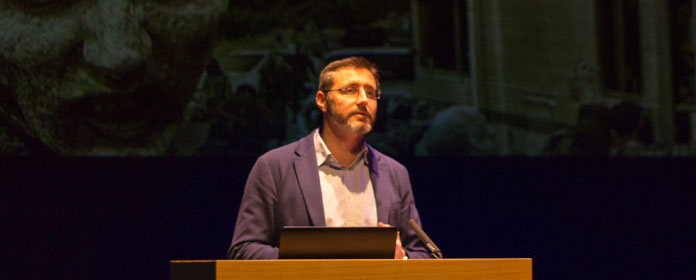"In the face of a status of anxiety and uncertainty such as the pandemic, new to everyone, fiction financial aid helps us to make sense of it".
Alberto García, professor at School of Communication and partner of the ICS, points out that "in apocalyptic or pandemic fictions we glimpse how what we are living could end and that generates a certain sense of certainty".

PHOTO: Elisabet Frauca
During the pandemic, fiction consumption has been a fundamental way to "escape" from confinement. Streaming platforms such as Netflix, HBO Amazon Prime Video, Movistar Plus, and Disney + have experienced a considerable increase in their issue subscribers. For example, Netflix has gained 16 million users, reaching 182.9 million, and Disney + has reached 50 million at the beginning of April, only five months after its launch.
"Series such as The Mandalorian, which is pure escapism, for example, have continued to be seen, and the premieres of the platforms have continued their course. In Spain, La línea invisible (The Invisible Line), which deals with the first ETA assassination," said Alberto N. García, professor at School of Communication at the University of Navarra, partner at project 'Emotional culture and identity' of the Institute for Culture and Society (ICS) and author of the blog Diamantes en serie.
In this context, the Internet and social networks have been filled with recommendations for films and series on pandemics, catastrophes and apocalypses. "I sense that it is reasonable that more works of these characteristics have been seen because in the face of a status of anxiety and uncertainty like this, totally new for everyone, fiction financial aid us to find meaning," stresses Professor Garcia.
He points out that, since the Greek classics, "fiction allows us a vicarious experience, to live the lives we could never lead. Thanks to it, "we have felt what it's like to be at the Normandy Landing or to fight against the Empire aboard a spaceship in 'Star Wars,'" he says.
He adds that something similar could operate in the current context: "In apocalyptic or pandemic fictions we get a glimpse of what this could all end up in -usually in the worst scenario- and that generates a certain feeling, at least, of certainty. Saving distances, we could say that these fictions calm us down".
The promise of anticipating the outcomeSome catastrophist films have experienced a real boom during these months, such as Contagion, from 2011, which tells the story of the spread of a virus around the world. Many media outlets and web sites have stated emphatically that it is one of the most watched films during the quarantine period.
Especially at the beginning of the pandemic, it offered us a story," says the researcher. And a story, especially in a popular culture production like this one, is a promise of meaning: there is a beginning, a middle and an end. The whys and wherefores are explained". For the expert, "maybe the viewer is just curious or maybe, in his inner regional law , he wants to have a vision of how this could end".
However, he stresses that reality is complex and there is no single explanation as to why certain fictions are consumed. In his opinion, there are a multitude of factors that may intervene in viewers' decisions, such as the family context.
There is no doubt that this subgenre -to call it something- is enormously attractive to many people. For Alberto García, among the classic conflicts that feed any drama -internal or relationship, for example-, the "cosmic conflict" has always existed. "Precisely, because in real life there are also these penalties originated by nature, not by other people: volcanoes, tornadoes, hurricanes. What makes them attractive, I think, is to contemplate how man faces the impossible, the unexpected," he argues.
Parallels with adventure filmsThey are, from agreement with him, "tales of adventure and greatness, of overcoming almost superhuman adversity". He explains that for this reason, their structure, "overcoming obstacles until victory is achieved, that is, the taming or control of that catastrophe" presents parallels with adventure films. "That's what makes them attractive: you continually have to face trials to achieve glory," he says.
He argues that they have their roots in Greek culture itself: "There it could be the gods who sent calamities for our hero to prove his worth; here it is a more updated version of the same myth subject ". And remember that these myths also appear in the Bible, such as the universal flood or the plagues of Moses.
The catharsis of these works, he concludes, is the victory over the elements: "In the conflict against nature, if the hero wins, the feeling in the spectator is one of satisfaction, that we are still that perfect machine -man: human intelligence, the social service, moral progress- that has allowed this civilization to advance to such lofty heights".




